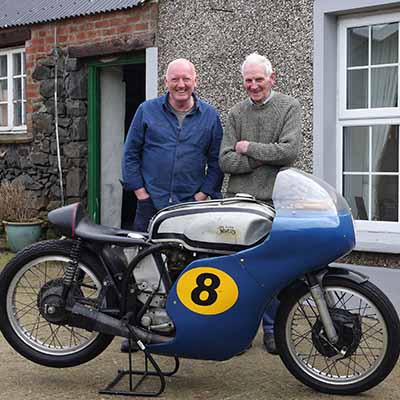USBF documentary reveals our connection with road racing in The Motorcycle Mavericks

Date Posted: September 6, 2022
The Ulster-Scots Broadcast Fund documentary, The Motorcycle Mavericks, reveals how our connection with road racing has been shaped since the wheels of industry put Ulster on the map. Made by DoubleBand Film, the film airs on Tuesday 13th September at 10:40pm on BBC One Northern Ireland.
The one-hour documentary tells the story of how engineering pioneers from Northern Ireland, working in garden sheds and workshops, took on the world in the quest for speed. Road racing is synonymous with Northern Ireland. While racers have been making history for 100 years there is another story running alongside – the desire to understand how the motorcycle works, to make it go better and go faster.
Presented by photographer and journalist Stephen Davison, who has been chronicling the sport and capturing the motorcycling family on film for more than 30 years, The Motorcycle Mavericks tells how people from Northern Ireland, many with an Ulster-Scots background, became pioneers in road racing. Stephen takes viewers on the journey that united engineering innovators and racers for almost a century.
With Ulster’s industrial heritage, it isn’t surprising that the interest in machinery led to a passion for motorcycles and sparked a desire to innovate. But before there was road racing, there was sand racing. Stephen catches up with John Scott and David Boyd on Benone Strand with one of the bikes which would’ve raced there when sand racing first took place in 1911.
With the creation of Northern Ireland in 1921, a new opportunity arose for those in power and those racing enthusiasts. The Ulster Grand Prix was proposed by racing fan, entrepreneur and Ulster-Scot Harry Ferguson with the backing of fellow Ulster-Scot and new Northern Ireland First Minister, James Craig. The unprecedented sporting event would be an opportunity Craig would not pass by. Ferguson wrote that the event would attract an enormous number of people to the country and benefit every industry.
Motorcycle road racing was emerging as a popular sport. And not just for men. Stephen talks to two of today’s leading women racers, Melissa Kennedy and Yvonne Montgomery, reflecting on trailblazer Muriel Hind who was the first woman to compete in an Irish motorcycle event.
Stephen visits the original Clady circuit, home of the Ulster Grand Prix. He follows the path of some of our most successful riders including Joe Craig who would go on to greater success as manager of the factory Norton team – one of the best in the world. Also working with the team in the late ’40s was self-taught engineer and designer, Rex McCandless, an Ulster-Scot from Hillsborough – the inventor of the game-changing ‘Featherbed Frame’. Norton destroyed the opposition at the Isle of Man TT in 1950 and McCandless would change motorcycle racing design for decades to come.
Local riders and engineers continued to seek success. By the early 1960s, Italian and Japanese machinery were beginning to dominate. But a Bushmills farmer, Richard Creith, riding a Norton tuned by Ballyclare fireplace salesman and fitter, Joe Ryan, proved that the famous marque could still compete– winning two North West 200s and the Ulster Grand Prix in 1965.
That year, a motorcycling enthusiast from Larne, Professor of Mechanical Engineering at Queen’s University Belfast, Gordon Blair, became involved in Irish road racing. The University designed and built the machines yielding huge success. Stephen meets one of Blair’s students, Robert Fleck and rider Ray McCullough. The team at Queen’s would go on to develop a partnership with Yamaha to help develop their engines. Robert himself would go on to become Professor of the Mechanical Engineering department and take the University to a global audience competing in Grand Prix racing with rider Jeremy McWilliams.
But with success there often comes tragedy. Some have paid a heavy price in the sport – none more than the Dunlop family from Ballymoney. Stephen meets Jim Dunlop from the famous racing dynasty to find out where they learned their mechanical knowledge and ability to set up and tune their own machinery and their passion for motorcycle racing.
The passion for motorcycle racing has also been passed from generation to generation in another famous racing dynasty from Larne. Stephen talks to six-time World Superbike Champion Jonathan Rea, son of Johnny Rea – TT and Irish championship winner.
Stephen Davison has been a fan of motorcycle sport since he attended his first race in 1974 and is the author of nine books on the subject. He said: “Long before I ever picked up a camera I had heard of the great racers who hailed from this part of the world in the past. Making The Motorcycle Mavericks has allowed me to dig much deeper into that rich history and discover the huge impact they made on the international stage.
“Reading in books about figures like legendary Norton team boss, Joe Craig, brilliant engineers such as Rex McCandless and Joe Ryan or great riders like Joey Dunlop is one thing but meeting historians and people who knew them personally has brought their personalities and legacies to life.
“Seeing the machines they designed, exploring the circuits they raced on and listening to the tales of legends such as Dick Creith, Ray McCullough, Jeremy McWilliams and Jonathan Rea has been thrilling. And here and there along the way I even got to have a go on a bike myself!”



